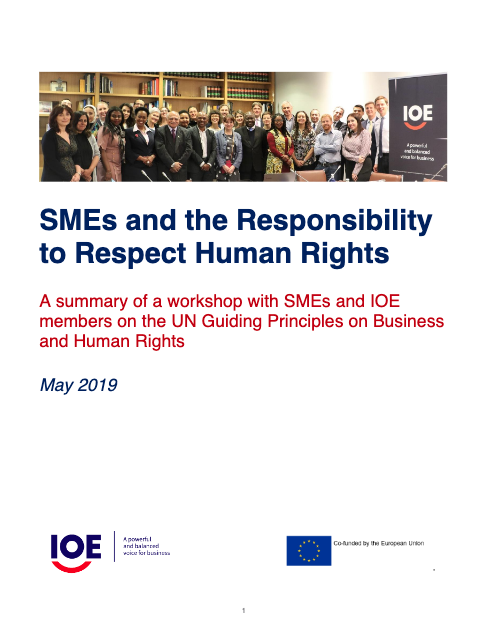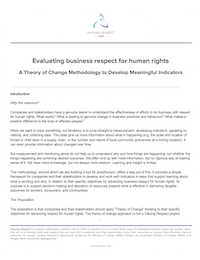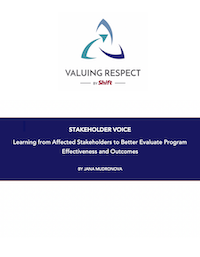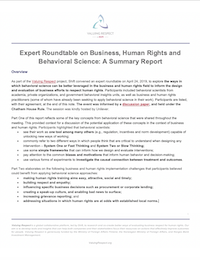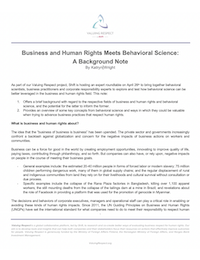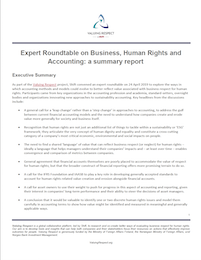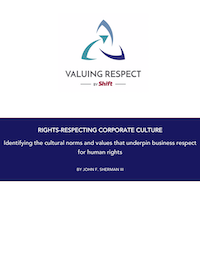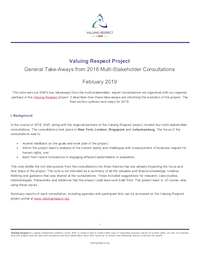In April 2019, Shift and the International Organisation of Employers (IOE) co-convened a workshop to explore the challenges, experiences and leading practices of small and medium enterprises (SMEs) in fulfilling their responsibility to respect human rights. This summary note, published by IOE, provides an overview of the key takeaways.
Archives: Resources
Evaluating Business Respect for Human Rights: A Theory of Change Methodology to Develop Meaningful Indicators
In this piece, we discuss our Theory of Change methodology, and why it’s such a valuable tool for evaluating business respect for human rights.
Stakeholder Voice: Learning from Affected Stakeholders to Better Evaluate Program Effectiveness and Outcomes
An increasing number of companies, investors and civil society organisations have expressed the need to better evaluate the effectiveness of company efforts to mitigate adverse human rights impacts in terms of outcomes for affected stakeholders. This paper focuses on ways to involve “stakeholder voice” in that evaluation, by which we mean the experiences, perspectives and insights of affected stakeholders. These are stakeholders who are affected by companies’ operations and business relationships, and can include community members, workers and consumers.
Expert Roundtable on Business, Human Rights and Behavioral Science: A Summary Report
This document summarizes our expert roundtable on April 24, 2019, where we explored the ways that behavioral science informs the public sector, and presented this research in an attempt to find ways in which these practices could be used to promote business respect for human rights.
Business and Human Rights Meets Behavioral Science: A Background Note
This pre-read for our April 26th consultation in London provides a brief overview of current thinking in behavioral science, and ways we might apply that thinking in a business and human rights context to improve outcomes for people.
Expert Roundtable on Business, Human Rights and Accounting: A Summary Report
This document is a summary of the expert roundtable discussion on business, human rights and accounting that took place on April 24, 2019, in collaboration with Manchester Business School, St Andrew’s University, and hosted by the Institute for Chartered Accountants of England and Wales.
Addressing Sector-Wide Risks Through Negotiated Covenants in the Netherlands
Seven agreements have been signed as part of this process: garment and textile | banking | gold | natural stone (pilot) | food products | insurance | pension funds |
Shift is pleased to be providing expert support to the SER, and the Dutch Ministry of Foreign Affairs, as part of a pioneering process that has brought together companies, governments, unions and civil society, across key business sectors, to try to prevent human rights risks and ensure responsible business conduct in critical global value chains.
The process also seeks to address environmental impacts, corruption and taxation practices and other negative impacts covered by the OECD Guidelines for Multinational Enterprises.
“In our work on fostering sustainable supply chain management among Dutch industry, Shift has been extremely helpful in elevating the policy discussion and business practice in the area of business and human rights. The Shift team’s unique combination of strategic policy advice and practical experience with companies and other stakeholders has been invaluable to our work.”
Mariëtte Hamer, President, Social and Economic Council of the Netherlands
This work is being undertaken in close collaboration with the SER – the advisory and consultative body of employers’ representatives, union representatives and independent experts that has been fostering sustainable supply chain management among Dutch industry since 2008. | See our explanatory note on prioritization of human rights risks prepared for the SER
In each sector, parties have identified severe risks that they are facing and developed individual commitments and collaborative approaches to address them. With the support of Shift, the SER has developed guidance -contained in its Advisory Report– to help parties ensure that the measures developed are credible, and aligned with international standards.
The expectation is that parties:
- Use credible methodologies, aligned with leading international frameworks, to identify sector-wide human rights, environmental, corruption and related risks;
- Identify collaborative approaches to building and exercising the leverage of sectors and their stakeholders to address such risks;
- Involve relevant stakeholders in credible, dialogue-based multistakeholder processes.
Shift has played a key role in building the capacity of all parties to play their envisioned roles as leaders, participants and conveners of a credible process aiming to assess and address sector-wide risks. This support has included workshops for a number of sector associations, together with expert stakeholders, held in The Hague and hosted by the SER. | Learn more about how Shift facilitates multistakeholder dialogue on business and human rights
Over the past years, Shift has also supported implementation of a number of specific agreements, most notably the Dutch Banking Sector Agreement. Our support to the parties involved in that agreement has included:
- Facilitating a workshop on human rights reporting, which led to the issuance of the first human rights reports by ING and Volksbank (Dutch) and of a second report by ABN AMRO.
- Providing expert input and leading the drafting of paper capturing learning from the “enabling remedy” working group, which among other themes, included exploring the concept of a “remedy ecosystem.”
- Supporting the “value chain mapping” working group by helping to shape its methodology and facilitating the process for the cocoa value chain mapping and part of the process for the palm oil value chain mapping.
In 2017, the Dutch Government recommitted itself to the process and is scheduled to undertake an evaluation in late 2019. The coalition agreement includes a provision to consider binding measures in case insufficient progress is deemed to be made. Shift looks forward to being a part of the evaluation process and discussions about what more is needed.
To learn more about the Sector Agreements, click here.
Shift and Former UN Human Rights Chief to Advise the International Olympic Committee on Developing a Human Rights Strategic Framework
New York, NY. – Shift Co-Founder Rachel Davis has joined efforts with former UN High Commissioner for Human Rights, Prince Zeid Ra’ad al-Hussein, to support the International Olympic Committee (IOC) in developing a strategic framework on human rights.
Rachel Davis and Prince Zeid will be working hand-in-hand with high-level IOC officials to conduct an in-depth assessment, informed by internal and external stakeholder consultation. Together, they will deliver high-level, strategic recommendations to the President and Executive Board of the IOC to set the foundation of a comprehensive human rights strategy and future work of the Human Rights Advisory Committee.
Since 2018, Shift has supported the IOC’s ongoing efforts to address human rights challenges, including those connected to bidding and candidature processes for the Olympic Games, and to the IOC’s role as the leader of the Olympic Movement.
Shift is driven by its commitment to play an objective, critical and transformative role in sport, and will continue to work side-by-side with other stakeholders to promote meaningful change in the sector.
To learn more, visit our dedicated page on Sports and Human Rights.
Rights-Respecting Corporate Culture: Cultural Norms & Values that Underpin Business Respect for Human Rights
This piece examines corporate culture, identifying the key elements that make a rights-respecting culture successful.
General Takeaways from 2018 Valuing Respect Multi-Stakeholder Consultations
This document summarizes our Valuing Respect consultations for 2018. In it you can find key takeaways and what we will be working on with the Valuing Respect project in 2019.
